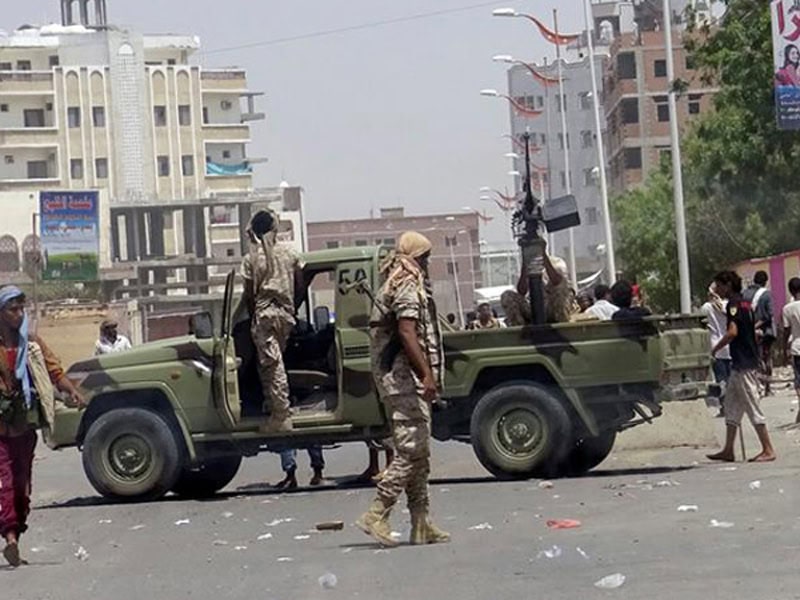Stockholm: Yemeni government representatives were expected to join a rebel delegation in Sweden on Wednesday for high-stakes peace talks aimed at ending four years of devastating war.
A 12-member team from the Saudi-backed government headed by Foreign Minister Khaled al-Yamani left Riyadh early Wednesday, sources told AFP, a day after rebel delegates landed in Stockholm accompanied by the UN peace envoy.
The first Yemen talks since 2016 are widely seen as the best chance yet for peace, as the international community throws its weight behind resolving the devastating conflict that has pushed the Arab world’s poorest country to the brink of famine.
The government delegation was carrying the “hopes of the Yemeni people to achieve sustainable peace”, the head of exiled President Abedrabbo Mansour Hadi’s office, Abdullah al-Alimi, said in a tweet.
The delegation had delayed its departure until the rebels had arrived in Stockholm after they failed to show up for the last UN bid to convene peace talks in September, complaining they had received insufficient guarantees of safe passage through the blockade enforced by a Saudi-led coalition since March 2015, sources close to the government told AFP.
The rebels flew in on a Kuwaiti plane from Sanaa on Tuesday — accompanied by UN envoy Martin Griffiths, who had promised to travel with them to allay their concerns.
Their arrival followed two major confidence boosts — a prisoner swap deal and the evacuation of 50 wounded insurgents from the rebel-held capital for treatment in neutral Oman.
The US State Department hailed the peace talks in Sweden as a “necessary and vital first step” and called on all parties to “cease any ongoing hostilities.”
The United Arab Emirates, another key backer of the Yemeni government, said the planned talks offered a “critical opportunity” to bring peace to a country in the grip of what the UN has described as the world’s worst humanitarian crisis.
Although no date has been announced for the start of the negotiations, Yemeni government sources said they could begin as early as Thursday.
– ‘Step in right direction’ –
The head of the 12-member rebel delegation, Mohammed Abdelsalam, said it would “spare no effort to make a success of the talks to restore peace and end the aggression”.
At the same time, he called on rebel fighters to remain “vigilant against any attempt at a military escalation on the ground”.
The announcement of a deal on Tuesday to swap hundreds of detainees was hailed by the International Committee of the Red Cross, which will oversee the exchange after the first round of talks in Sweden, as “one step in the right direction towards the building of mutual trust”.
The agreement, struck by the UN envoy in weeks of shuttle diplomacy, came after the wounded rebels were flown out for treatment on Monday meeting a key rebel precondition for joining the talks.
Yemeni government official Hadi Haig said between 1,500 and 2,000 pro-government personnel and between 1,000 and 1,500 rebels would be released.
On the government side, they include former defence minister Mahmoud al-Subaihi, who has been held by rebels ever since they overran the capital in late 2014, and President Hadi’s brother Nasser, a general and former senior intelligence official.
Rebel official Abdel Kader al-Murtadha confirmed the deal, adding he hoped it would be “implemented without problem”.
– Worst crisis ‘deteriorating’ –
Thousands of prisoners have been captured by both sides in the grinding war of attrition that has devastated Yemen at a cost of nearly 10,000 lives since the Saudi-led coalition intervened in March 2015, according to World Health Organization figures.
Human rights groups put the death toll far higher.
The resulting humanitarian crisis, already the world’s worst, will deteriorate in 2019, the UN said on Tuesday, warning the number of people needing food aid is set to jump by four million.
Overall, 24 million people in Yemen — roughly 75 percent of the population — will need humanitarian assistance in 2019, UN humanitarian chief Mark Lowcock told reporters in Geneva.
He said the stark figures underlined the importance of progress in the talks in Sweden.
If the negotiations show results, “it is possible that we could find by the second half of the year that the extreme edge could get taken off the suffering of those people who have no form of income,” he said.
International support for the new peace bid has been spurred by UN warnings that 14 million Yemenis are at risk of famine.
A coalition-backed government offensive on the rebel-held Red Sea port of Hodeida has threatened to cut virtually the only gateway for UN-supervised aid.
The coalition has largely suspended its offensive on Hodeida in the face of US-led calls for a ceasefire and new peace talks.
But fresh fighting flared on Monday and the coalition spokesman said military operations were “ongoing”.
Additional momentum towards peace has come from the mounting Western pressure on Saudi Arabia since the murder of dissident Saudi journalist Jamal Khashoggi inside the kingdom’s Istanbul consulate on October 2.
[source_without_link]AFP[/source_without_link]

